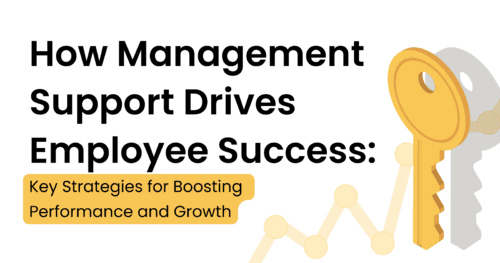
How Management Support Drives Employee Success: Key Strategies for Boosting Performance and Growth
Oct 28,2024
Employee success is at the heart of every successful business. When companies focus on their teams, they see higher productivity, happier employees, and stronger growth. But what’s the secret ingredient to making this happen? It’s effective management support. Let’s dive into why supporting your team matters and explore practical ways to create an environment where employees can shine. Here’s how management support drives employee success and transforms workplaces.
Why Management Support Matters
Supporting employees means more than just offering guidance. It’s about empowering them, meeting their needs, and creating a culture where collaboration and trust thrive. When employees feel backed by their managers, they’re more likely to succeed.
The Power of Great Management
- Boosting Engagement Employees who feel engaged at work are motivated, productive, and loyal. A supportive manager can make all the difference by showing appreciation and encouraging input.
- Reducing Turnover High turnover can be costly and disruptive. When managers help employees navigate challenges and grow in their roles, it fosters loyalty and reduces the urge to leave.
- Encouraging Innovation A supportive environment inspires creativity. Employees are more willing to take risks and share ideas when they know their manager has their back.
- Balancing Work and Life Managers who understand the importance of balance help their teams avoid burnout and maintain productivity over the long haul.
Key Strategies: How Management Support Drives Employee Success
1. Create Open Communication Channels
Honest and open conversations lay the groundwork for trust. Make it easy for employees to share their ideas, concerns, and feedback.
- Regular Check-Ins: Schedule one-on-one meetings to connect and address issues.
- Open-Door Policy: Let employees know they can approach you anytime.
- Feedback Tools: Use surveys or anonymous feedback forms to gather insights.
Learn more about effective workplace communication.
2. Invest in Employee Development
Helping employees grow is an investment in your company’s future. Offer training and resources to keep their skills sharp.
- Tailored Learning: Create programs that align with career goals.
- Mentorship: Pair employees with mentors who can guide their development.
- Online Learning: Provide access to platforms like LinkedIn Learning or Coursera.
See how development programs benefit everyone.
3. Celebrate Wins
Recognition is a powerful motivator. A simple “thank you” or public acknowledgment can go a long way.
- Bonuses and Perks: Reward big achievements with tangible incentives.
- Team Shoutouts: Celebrate milestones in meetings or emails.
- Personalized Rewards: Consider tailored tokens of appreciation.
Explore ways to recognize employees effectively.
4. Build Strong Teams
Collaboration not only improves outcomes but also strengthens team bonds. Make teamwork a priority in your organization.
- Cross-Team Projects: Encourage departments to collaborate on initiatives.
- Digital Tools: Use platforms like Slack or Teams to streamline teamwork.
- Fun Activities: Organize team-building events to boost morale.
Discover how teamwork improves workplace success.
5. Lead by Example
Employees look to their managers for guidance. Set the tone by modeling the behavior you want to see in your team.
- Show Empathy: Be understanding of personal and professional challenges.
- Be Accountable: Own your actions and decisions.
- Adapt to Change: Embrace new ways of working and encourage others to do the same.
Learn why leading by example matters.
6. Support Work-Life Balance
A healthy balance between work and personal life is essential for long-term success. Show your team you care about their well-being.
- Flexible Schedules: Let employees choose hours that suit them.
- Remote Options: Offer hybrid or fully remote work where possible.
- Wellness Programs: Provide resources for physical and mental health.
See the impact of work-life balance.
Measuring Your Support Impact
Want to know if your efforts are making a difference? Here’s how to track it:
- Ask for Feedback: Use surveys to understand how employees feel.
- Monitor Performance: Keep an eye on productivity and achievements.
- Watch Retention Rates: A happy team stays longer.
These insights can help you refine your approach and keep improving.
Conclusion
Supporting your team isn’t just a nice-to-have—it’s essential for success. By prioritizing open communication, development, recognition, and balance, you can create a workplace where employees thrive.
At Yoocollab, we’re here to help you build amazing teams.
Whether you need outstaffing or outsourcing solutions, we’ll partner with you to unlock your team’s full potential and achieve your business goals.
Let’s get started! Contact Yoocollab today.